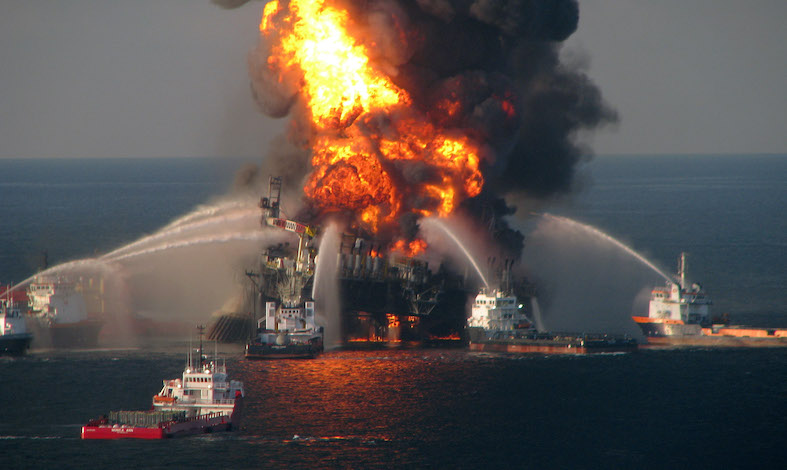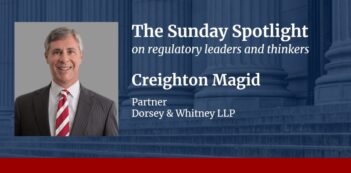
The Deepwater Horizon oil spill shows that market incentives alone do not guarantee sufficient safety and environmental measures.
This year marks the 12th anniversary of BP’s (formerly British Petroleum) Deepwater Horizon accident, which involved an offshore oil rig in the Gulf of Mexico that caused the largest marine oil spill in U.S. history. Such spills cause substantial economic harm, especially in tourism-dependent coastal areas. They also hurt fisheries, an important issue because fish provide about 17 percent of global animal protein intake.
Despite the harms caused by the Deepwater Horizon spill, the accident did not trigger major federal regulations. In part, politicians from oil-dependent coastal states lobbied for leniency. Former British Prime Minister David Cameron defended BP in his conversations with President Barack Obama.
In a recent research article, we found that stock markets were also lenient with BP and with the oil and gas industry more generally. This finding raises the question of what incentives exist for the oil and gas industry to ensure safety at offshore production sites, or even to exit from offshore production entirely.
This issue is important because, since 2005, about one third of global oil and 15 percent of U.S. crude oil comes from offshore sources. The Gulf of Mexico, where the Deepwater accident took place, accounts for about 95 percent of U.S. offshore oil production. And the recent Inflation Reduction Act might create more incentives for offshore drilling by obliging the federal government to auction oil and gas leases before it can issue permits for wind and solar energy.
In the last 50 years, the U.S. oil and gas industry has suffered two notable disasters. In addition to the Deepwater accident in 2010, an Exxon Valdez oil tanker struck a reef in 1989 in Alaska’s Prince William Sound, spilling about 11 million gallons of oil. In response, the U.S. Congress enacted the Oil Pollution Act of 1990 that required oil tankers and barges to have a double hull design. That law also obligates parties responsible for oil spills to pay for cleanup and restoration.
The 2010 Deepwater Horizon spill was about 20 times bigger than Exxon Valdez, spilling over 200 million gallons of oil. Eventually, BP paid over $60 billion in fines. A new federal regulation, the 2016 Wells Control Rule, emerged following the spill and the federal government created a new regulatory body, the Bureau of Safety and Environmental Enforcement. But these regulatory changes were modest in comparison to the response to Exxon Valdez and they did not impose significant regulatory costs.
In addition to the costs of fines and new regulatory burdens, it is often supposed that fear of reputational damage might lead firms to upgrade their industrial practices or to exit from offshore drilling altogether. After all, firms invest vast sums into their reputations, which confer a social license to operate. This social license helps firms to earn the goodwill of regulators, customers, and the workforce. But eventually, for firms to exit a sector—or, at minimum, invest in upgrading workplace practices—regulations, fines, and reputational damages must affect stock prices. After all, the compensation of top managers is often linked to stock prices.
In our recent article, we examined how the Deepwater accident affected BP’s reputation and stock price for the period from 2007 to 2017. We used a novel technique—synthetic control—to create a counterfactual BP because we wanted to assess how BP’s reputation and stock price would have fared in the absence of the spill. We constructed a synthetic brand that is sufficiently similar to BP but which did not experience the negative shock of the Deepwater accident.
To measure reputation, we drew on YouGov’s BrandIndex database, which reports respondents’ general impression of the brand, the perceived quality of the product, the value for money, and the respondent’s willingness to work for the company. For stock prices, we used S&P’s Capital IQ database.
We found that, after the 2010 accident, BP’s reputation dropped relative to the synthetic control. Although BP’s reputation recovered over the next 18 months, it stabilized around a lower level in the long run—defined as two to seven years—compared to the synthetic control. Thus, BP has suffered long-term reputational damage from the Deepwater accident.
This finding was surprising because, since 2000, BP had invested a substantial sum in a “Beyond Petroleum” advertising campaign to highlight its commitment to environmental protection. Furthermore, after the Deepwater accident, it invested about $500 million in brand enhancement. Yet, the reputational damage caused by the Deepwater accident seems to have persisted in the long term.
Even though we found an impact on BP’s reputation, we did not find that the Deepwater accident affected BP’s stock prices in either the medium term—defined as one to two years—or the long term. This finding calls into question whether stock markets create sufficiently strong incentives for firms to pay careful attention to industrial safety or to exit certain activities.
Any accident widely covered in the media could affect all firms in the industry. Consider the 1979 Three Mile Island accident that led to halting the construction of nuclear reactors in the United States. One reason for such an industry-wide effect is that the public cannot differentiate well between firms that have safer practices and those that do not.
Moreover, the public cannot boycott specific firms if all firms sell a generic product, such as gasoline. When products are differentiated, industry-wide reputational spillovers are not inevitable. The Volkswagen diesel scandal did not necessarily sully the reputation of Ford, Honda, or even German carmakers such as BMW.
The Deepwater accident did not seem to have diminished the reputations of other firms in the oil and gas industry. This outcome is probably why the industry did not launch any major initiative to assure the public that the industry was committed to the safety of its offshore facilities. Contrast this with how the chemical industry responded in the aftermath of a major industrial accident—the 1984 Union Carbide’s disaster in India—by launching an industry-wide “Responsible Care” program. But the oil industry launched no such initiatives after the Deepwater accident.
Similarly, we do not find that the stock prices of other oil and gas firms were affected by the Deepwater accident. Neither they nor BP paid any discernible price from investors for an industry catastrophe that inflicted enormous environmental damage on the Gulf Coast region.
In sum, as the rush to drill offshore oil and gas continues, it is useful to keep in mind the extent to which stock markets could create incentives for firms to take workplace safety and environmental concerns seriously—or not.






